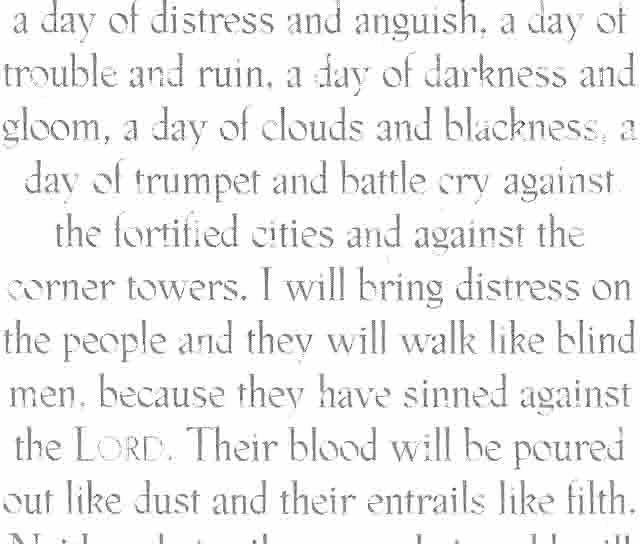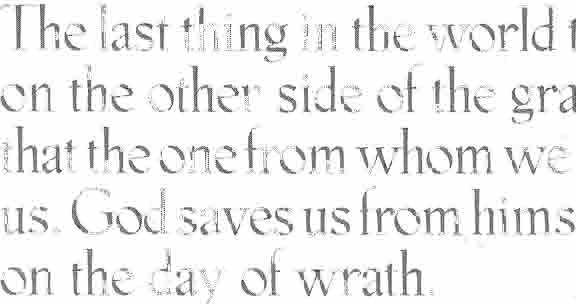
12 minute read
BROTHER, ARE YOU
B'lothe'l, ;4'le )Iou S aved?
BY R. C. SPROUL



W[he great day of the IJ)RD is nearnear and coming Listen! cry on the day of the LC)RD \vill be bitter, the shouting of the \varrior there. l-hat day vviI1 be a day of vvrath, a day of distress and anguish, a day of trouble and ruin, a day of darkness and gloom, a day of clouds and blackness, a day of trumpet and battle cry against. the fortified cities and against the corner tC'l\vers. 1'viI1 bring distress on the people and they vvilIvvaHz like blind tuen, because they have sinned against the LC)RD. I-heir blood 'vill be poured out like dust and their entrails like filth. Neither their silver nor their gold 'vill be able to save then1 on the day of the
LORD's \vrath. In fire of his jealously the vv-hole vvorld 'viII be consumed, for he\villmake a sudden end of all\vho live in the earth" (Lephaniah t14-18).
Several years ago, I was walking across a courtyard on the campus of Temple University in Philadelphia. I was alone, minding my own business, on'the way to the faculty lounge in the School ofTheology, when suddenly out ofnowhere a gentleman stood in front ofme blocking my movement. «Are you saved?," he demanded. I wasn't quite sure how to respond to this intrusion and the first words that came into my mouth were, «Saved from what?" What I was thinking, but was given the grace to refrain from saying, was that I'm certainly not saved from strangers coming up to me and asking me questions like this.
When I said, «Saved from what," Ithinkmyfriend was as surprised by my question as I had been by his and he kind oflost it. He stammered and stuttered and wasn't quite sure how to respond to the question, « Saved from what?" «Well, you knowwhat I mean," he replied. «Do you know Jesus?" That brief encounter left an impression on me.
On the other hand, ofcourse, I was delighted in my soul that somebody cared enough about me. Even as I was a stranger, this person was concerned enough to stop me and ask about II\Y salvation. But what distressed me was that it was clear that though this man had a zeal for salvation, he had little understanding of what salvation is.
How easy it is for us to speak in jargon, in words without any content. As Christians, we develop our own speech patterns. I remember one fellow I used to play golf with whose wife became a Christian and he remained an unbeliever. He said to me on one occasion, (Tm happy for my wife's conversion, but you, know R. C., there's one thing that frustrates me to no end." «What's that?," I said. «My wife never tells me anything anymore. She shares it."
I had an opportunity to get from him the pagan response to some of our language patterns. When we're talking about salvation, we are talking about the concept that is the central theme of all of the sacred Scripture, a concept that is simply imperative that we understand. When we examine the Scriptures and search the meaning of the term «salvation," the first thing that we notice is that term «salvation" is used in a wide variety_ ofways. ..
All sorts of,ipings are discussed in terms of the noun «salvation"'br the verb «to save". Paul and Silas were freed from the jail in Philippi when God delivered them by the earthquake. In panic, the jailer came up to Paul and Silas and said, «Sir, what must I do to be saved?" And Paul responded immediately by saying, «Believe on the name ofthe Lord Jesus Christ and you and your household will be saved."
---[he last thing in the \vorld the unrepentant sinner ever \vants to meet on the other side of the grave is God. But the glory of the Gospel is that the onefron1 whom \ve neec1 to be saved is the very one \vho saves lIS. God saves us from himself. But\voeunto those who l1ave no savior on the day of wrath.


N ow, think I know what Paul meant by salvation when he responded to the jailer, but I have wondered what was in the jailer's mind? Here is a man who is responsible to the government for the guarding and keeping of prisoners; and the law in that day, in the provinces was simply this: if prisoners escaped from the jail, whatever penalty they were awaiting to suffer for their crimes, their jailer had to take in the escapees' place. So when the walls of the jail fell down and the prisoners started to run free, this jailer runs to Paul and Silas and asks them about salvation.
NoW, it is certainly possible that what he had in his mind at that moment was a question abouthis eternal destiny, about his relationship with God, and having heard Paul and Silas singing hymns and knowing that they were religious fellows, he then addressed the question to the greatest theologian in history, the apostle Paul: "What must I do to be saved?" Or maybe all the jailer hadinhis mind was how he was going to escape from the consequences ofthis jailbreak. The word "salvation" in the Bible doesn't always refer to the ultimate question of salvation in terms of being reconciled with God.
A woman comes to Jesus for healing and beseeches him to cure her ofher disease and Jesus touches her and heals her and says to her, "Go in peace, your faith has saved you." They did noteven talk about reconciliation with God. The woman was looking for relief from pain and sickness. She was wanting to be saved from disease and Jesus saved her from the disease.
Now, when Jesus said, "Your faith has saved you," he may have mzeant it in the ultimate sense or maybe he didn't. Every time the Bible uses the word "salvation" or the verb "to save" it does not refer necessarily to what we mean by the doctrine ofsalvation.
The Bible teaches that we have been saved from the foundation of the world (Eph 1:4-13). Here the ultimate past sense is used for salvation. So, in one narrow sense, at least from all eternity in the hidden wisdom of God, we were saved. That is why Jesus says that there will come a moment when the Father will say, "Come mybeloved, inherit the kingdom that was prepared for you from the foundation ofthe world."
But, the Bible also uses the imperfect tense and says there is a sense in which we were being saved. But salvation from the hands of God for his people is something that he has been accomplishing through all of the pages of history. Our salvation was being prepared for us through the call ofAbraham and the life of Isaac and of Jacob. Throughout the life of Israel, the Church-of which we are a part-was being saved, awaiting the Day ofSalvation in the advent ofChrist.
And then the Bible speaks ofsalvation in the present sense. There is a sense in which we are saved. The moment one puts his or her trust in Christ and in Christ alone, that moment God pronounces the believer just in his sight. He imputes the righteousness of Christ the believer's account and he or she is safe in the arms ofJesus, saved.
The Bible also teaches that we are being saved. Therefore, in one sense, salvation is not simply a completed event, but begins with justification and leads on to sanctification. As one grows in grace, that process of sanctification is also described as a process ofsalvation. Finally, the Bible speaks ofthe future when we shall be saved. Weare saved, we are being saved, we shall be saved.
Aswelook forward to ourglorification together with Christ and the final consummation ofour salvation, it is with this realization that we have been saved (i.e. justified) and are being saved (i.e. sanctification).
Therefore, let us focus our thinking on the ultimate sense ofsalvation, and I repeat the question that I asked my friend in Philadelphia so many years ago: «Saved from what?" Paul explains that we are to receive the "son from heaven, whom [God] raised from the dead - J esus;'who rescues us from the coming wrath (1 1:10). The ultimate salvation that any human can ever experience is rescue "from the wrath that is to come." Do you believe that there is a wrath that is to come?
I think the greatest point ofunbelief in our culture and in our Church at this juncture in the 20th century is an unbelief in the wrath of God and the certain promises ofjudgment for the human race.
I talk to people all the time about Jesus and they say things like this: "R. C., ifyou find believing in Jesus meaningful-ifthat turns you on and gives you some kind ofsolace or whatever-then that's fine for you, but I don't feel the need for Jesus." What does this say? It is as ifsomebody were to say, "I don't feel the need for a fireman," because his house is not on fire. Who needs a fireman when there is no fire? Who needs a savior when there is no clear and present threat of judgment? Modern man simply does not believe that there will be a day ofjudgment. Ifwe believed it, really believed it, the energy of our evangelism would increase a hundredfold. !J n the Old Testament the difference, between. the true prophetandthe false prophet was that the true prophet proclaims the day ofthe Lord as a day of consuming wrath. People did not want to hear that, so the false prophet got rich promising the people that the dayofthe Lord was a day ofbrightness, light, andjoyand thatthere was nothing to worry about: "Smile, God loves you and has a wonderful plan for your life." The plan will notlook so good on the day of judgment for those who do not repent, for Godwill speak to them in his fury. Thatwas the message ofIsaiah, ofJ eremiah, ofEzekiel, ofDaniel, ofMicah, ofAmos; and every other prophet ofGod.
Amos came to the people and he said to the people, "You celebrate the day ofthe LORD. Don't you realize thatthe dayofthe LORD is a dayofdarkness; there's not light in it, for it is the day when God will speak in wrath and his anger will consume the planet and his judgmentwill go forth and his violence will be seen in the streets." Can't wait for the return ofJesus? oh, happyday! Yes, for the saved, but for the unsaved, the return of Jesus is the worst of all conceivable calamities. Listen again, not to me, but to the word of God: «Near is the greatest day ofthe LORD; near, coming very quickly, a day of wrath is that day a day of trouble ofdistress, destruction, desolation, darkness, gloom. On the day ofthe LORD'S wrath, all ofthe earth will be desired for he will make a terrifying end to the inhabitants ofthis world" (Am 5:18-24).
Again, at the core ofthe biblical message ofsalvation is this, which is also obscured in modern thought: "Salvation is of the LORD" (Jonah 2:9). No human being has the resources, thepower, the money or the merit to save himself.
A few years ago, I was in the hospital for kidney stones. Ifyou have ever had kidney stones, you know what catastrophe means. It was Christmas-time and I was lying in mybed and looking up at the television set on the wall, spinning the dial. And I came to the worship service that was coming from Hollywood Presbyterian Church in California. The minister was reading the Christmas Story from Luke. How many times have you heard the Christmas Story from Luke? "Par, beloved, unto you is born this day in the city of Bethlehem, a savior, who is Christ the Lord."
I heard that a thousand times. As a lay there with these kidney stones, I said "Oh, that is what I need right now-I need a savior: (it is well with my soul,' but my kidney needs to be saved, quickly!"
What do you need to be saved from? You need to be saved from God! Not from kidney stones, not from hurricanes, not from military defeats. The thing that every human being needs to be saved from'is God.
The last thing in the world the unrepentant sinner ever wants to meeton the othersideofthe grave is God. But the glory ofthe Gospel is that the one from whom we need to be saved is the very one who saves us. God saves us from himself. But woe unto those who have no savior on the day ofwrath.
The Bible says that on that day, the unbeliever will scream to the mountains to fall upon him; to the hills to hide him. He will be looking for refuge from nature itself, saying, "Cover me, give me a shield." But, there is only one shield that can protect anyone from the wrath that is to come, and it is the covering of the righteousness ofChrist.
When we put our faith in Jesus, God clothes us with the garments of Jesus and the garments of his righteousness are never the target ofthe wrath ofGod. The one who trusts in Jesus has peace with God and there is no condemnation left. And as it was in the days of Noah, when calamity struck, the day of the Lord came and almost all ofthe world perished in the flood. Believing Noah and his family alone were spared.
The day ofthe Lord was a day ofsalvation for the Christians, a day oflight and there is no darkness in it. Are you saved? The answer to that question is the most important question you will ever know.
R. C. Sproul, theologian, minister, and teacher, is chairman ofthe board for Ligonier Ministries. His is widely known for his videocassette series on topi cs of th eology, apologetics, and the Christian life. Dr. R. C. Sproul is a graduate of Westminster College, Pittsburgh Theological Seminary, and the Free University of Amsterdam. His many books include Chosen by Cod, The Holiness of Cod, and Faith Alone: The Evangelical Ooctrin.e ofjustificatiofl


